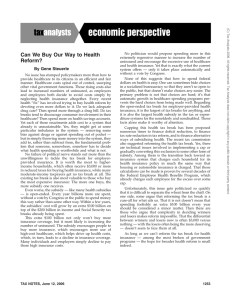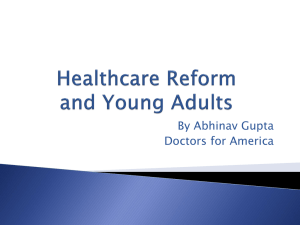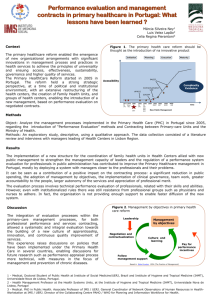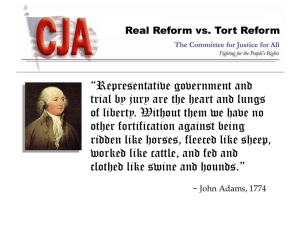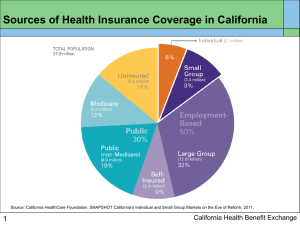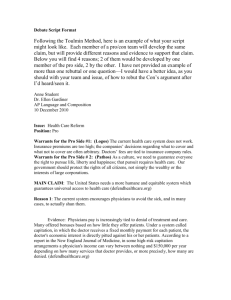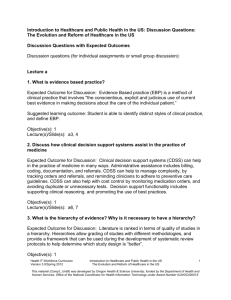Why Is Healthcare Reform So Difficult?
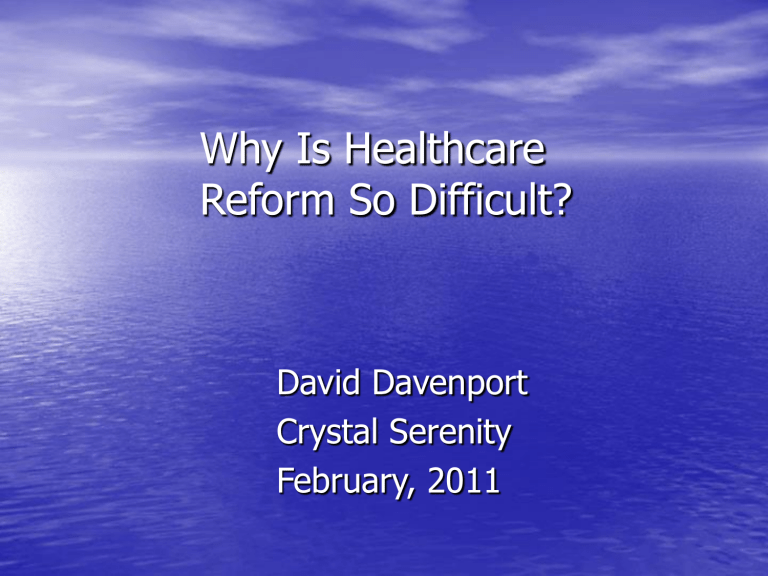
Why Is Healthcare
Reform So Difficult?
David Davenport
Crystal Serenity
February, 2011
Washington, D.C.
The Difficulty
Heated Rhetoric, Complex Issues
51 Million Uninsured?
– About 11 million are noncitizens
– About 16 million adults eligible but not insured
– About 7 million kids eligible but not insured
– Another 9 million have incomes over $66k
So real number closer to 16 million
Heated Rhetoric, Complex Issues
WHO says US life expectancy #42 in world?
--Remove homicides
--Remove traffic fatalities
We’re Number One
The Difficulty
The Science & Technology
Are Rapidly Changing
Economics Are Becoming
Unsustainable
45%
40%
35%
30%
25%
20%
15%
10%
5%
0%
1795
War of
1812
1820 1845
Federal Budget Outlays: 1795-2065
(as percentage of GDP)
World War II
Civil War
World War I
1870 1895 1920
Year
1945
Projected
Medicare
&
Medicaid
Social Security
1970 1995
2008
2020 2045
John F. Cogan
Hoover Institution
1/10/09
But Costs Difficult to Manage
• #1 cost driver is technology and improved healthcare
• There is also waste, perhaps as high as
20-25% but difficult to squeeze out
Waste To Be Eliminated
• 3 rd party payor problems (moral hazard)
– $5 of every $6 paid by “someone else”
• Regulatory cost
• Malpractice, lawsuits
• Tax policy drives employer plans
Different Political Philosophies
The Equality vs. Liberty Narratives
From the French Revolution: Liberte, egalite et fraternite
From the American Revolution: life, liberty and the pursuit of happiness
The Liberty Narrative
• Equality of opportunity
• Limited role of government
• Individual freedom and choice
The Equality Narrative
• Equality of outcomes
• Government oversight
• Limits on free markets and individual freedom to institutionalize equality
Healthcare Reform in the 60’s
Healthcare Reform in the 90’s
Health Care Reform in 2010
What Would Happen In “Ordinary”
Times?
• American people don’t generally support major overhauls
• With 15% uninsured and 80% + happy with their healthcare, felt need for overhaul isn’t widespread
• So work on individual pieces of problem
But These Were Not “Ordinary”
Times
• President Obama wanted to spend his political capital on this
• Both Congress and Senate were in his party
• Tough economic times create greater support for more safety net
Obamacare: Will It Survive?
• Repeal highly unlikely
• But Congress may alter it in other ways
• Constitutional challenges are real
• Public is ambivalent
Repeal and Replace
For individuals
• National market, portability
• Preexisting conditions
• Tax relief and subsidies for uninsured
Individual Fixes for System
• National market
• Information/accountability for choices
• Change tax incentives
• Reform medical malpractice laws
Why Is Healthcare Reform So
Difficult?
